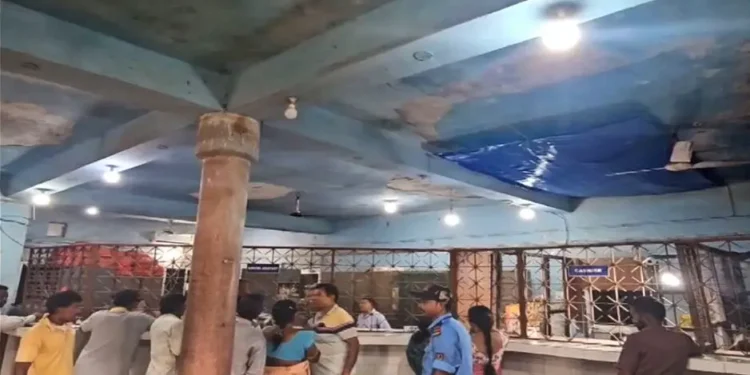Bhubaneswar- In Odisha’s Sundargarh district, the Bonai Cooperative Bank is operating under plastic sheets instead of a proper roof. Inside the branch, falling plaster and hanging ceiling fans have turned the office into a daily risk zone for employees and customers alike. Water leaks from the damaged ceiling are temporarily managed with polythene sheets strung overhead, while exposed electrical wiring raises serious concerns about fire hazards. Despite funds being sanctioned for repairs, no visible work has started, leaving staff to operate in conditions that threaten their safety and dignity.
This is not an isolated case. Several recent incidents across the state paint a grim picture of decaying banking infrastructure and a lack of enforcement of basic safety protocols. On April 9, 2025, a fire broke out at Urban Co-operative Bank in Kendrapara, reportedly caused by a short circuit. Important documents were destroyed, and firefighters had to battle thick smoke for over an hour to bring the situation under control. A similar fire incident was reported on February 9 at the Punjab National Bank branch in Jagatsinghpur, where electronics and records were lost in a three-hour blaze that required multiple fire tenders to control. Once again, a short circuit was blamed.
Another fire at Union Bank’s Sarabahal Road branch in Jharsuguda on April 6 was traced to an air conditioner left running overnight. While that fire was brought under control before the building suffered structural damage, key files were destroyed. Investigations into these incidents revealed that none of the affected branches had complete power shutdown systems in place during non-operational hours.
These repeated failures expose a deeper issue within the rural and semi-urban banking infrastructure of Odisha. Electrical systems are outdated, fire safety protocols are either missing or ignored, and even the most basic repair work is delayed for years. While the Reserve Bank of India has acknowledged the rising risk and is reportedly planning statewide safety audits, the damage already done reflects a concerning lack of urgency and accountability.
Until these gaps are addressed with serious investment and oversight, banks in Odisha may continue to function more as fire hazards than financial institutions, putting both public money and lives at stake.



